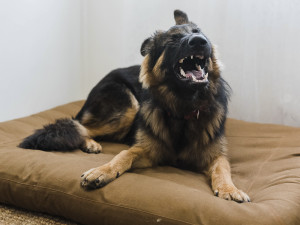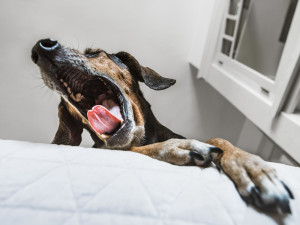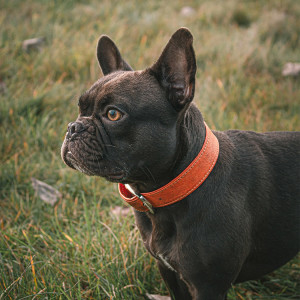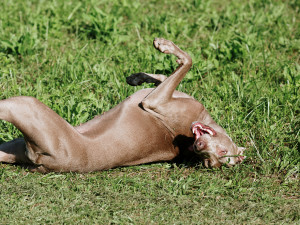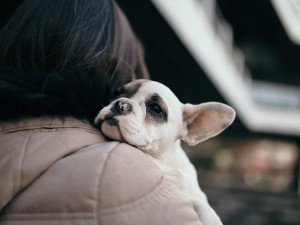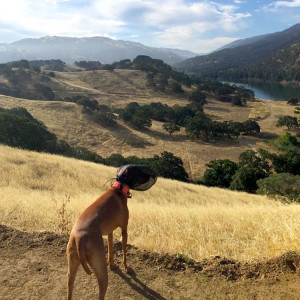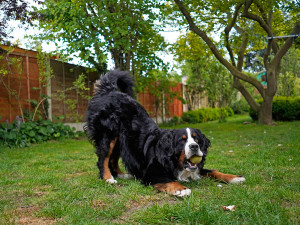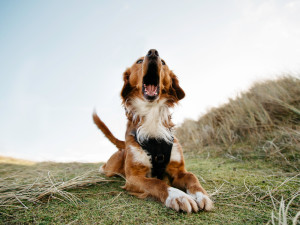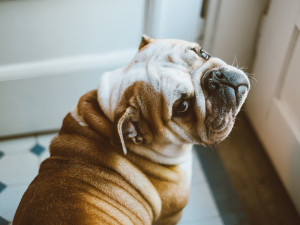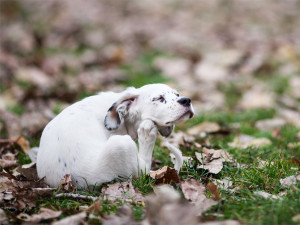Why Do Dogs Sneeze?
Other than to completely freak you out.
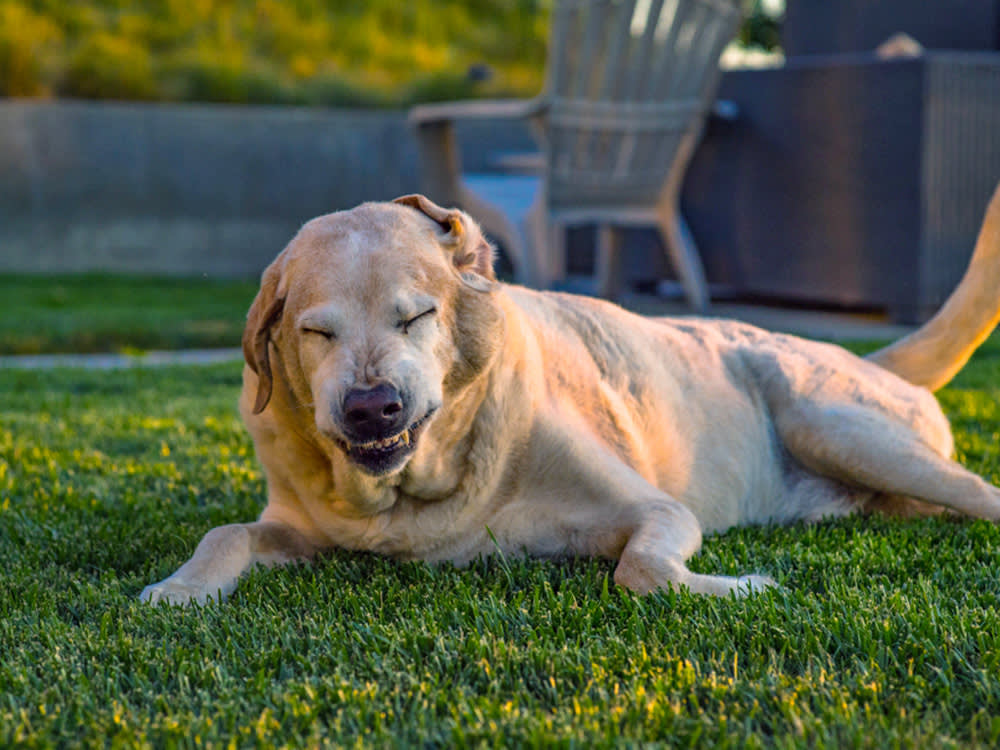
share article
In This Article:
How Sneezing Works opens in a new tab How Much Sneezing Is Normalopens in a new tab 8 Reasons Why Your Dog Might Keep Sneezing opens in a new tab Breeds Prone to Sneezing opens in a new tab When to Contact Your Vet opens in a new tab Frequently Asked Questionsopens in a new tab
Frequent dog sneezing may stem from environmental factors, infections, irritants, or breed predispositions. Identifying the cause is crucial for proper treatment and your dog's overall health.
Your dog’s sense of smellopens in a new tab is their superpower — they use their nose to decipher the world. So it’s no surprise that, like people, they occasionally sneeze. Random sneezes aren’t necessarily something to be concerned about, but a dog sneezing a lot may be showing signs of a health condition requiring medical attention.
Uncontrolled or excessive sneezing in dogs can be caused by something as simple as pollen, household products (another reason to always use pet-safe versionsopens in a new tab), perfume, second-hand smokeopens in a new tab, or water inhaled while swimming or during a bath. Dogs will even sometimes sneeze when they’re excited, or during play. While it’s likely that your dog’s sneezing is nothing to worry about, some dog sneezing should definitely be paid attention to and treated by a veterinarian as soon as possible.
How sneezing works
Most of the time, sneezing is the result of transitory irritation of a dog’s nasal passages. When your dog sneezes, it’s the body’s way of dislodging or expelling the irritant. If that irritant is small, say, a stray bit of leaf, a snip of freshly cut grass, or some other small object that gets hoovered up during your dog’s investigation of their environment, a sneeze or two is usually enough to do the trick. However, that’s not always the case.
If your sneezing dog has nasal swelling, a persistent runny nose, nose bleeds, or is pawing at their nose, have your vet check them out without delay. Read on for the most common reasons your dog might be sneezing a lot.
How much sneezing is normal?
Giving an exact number of doggy sneezes to be worried about is impossible. A few isolated sneezes throughout the day are to be expected for most dogs. Usually, you’ll be able to determine the cause pretty quickly — when they’re not sleeping, dogs often have their nose buried in something interesting. Taking a big whiff of a very strong scent, dusty area, or plant full of pollen can trigger sneezing in dogs, just like it does in people. If the sneezing stops quickly and a likely cause is apparent, the sneeze is probably normal.
Random sneezing events when your dog is sleeping or relaxing are harder to figure out. Generally, they’re not a big concern as long as they’re not happening frequently, and your dog is happy and symptom-free otherwise.
What if my dog sneezes many times in a row?
Whatever triggers a sneeze will sometimes trigger a handful of sneezes in a row. Some dogs seem prone to small bouts of sneezing, while others seem to be solo sneezers. You may come to learn your dog’s normal over time and know when to expect more sneezes.
What is a dog sneezing attack?
Something in your dog’s nasal passages that is particularly irritating or that refuses to come out easily may cause a fit of sneezing. During sneezing attacks, dogs will be alert and responsive, but have persistent bouts of sneezing for a short time. Sometimes you may be able to find something that shot out of your dog’s nose, but usually it’s just a gross misting of snot on your favorite rug. Aren’t dogs great?
8 reasons why your dog may be sneezing
1. Dog play-sneezing
Is your dog sneezing when excited? When your dog is having fun rollicking with their pals, they might be doing something called play-sneezingopens in a new tab. Sometimes a dog will sneeze to signal to other dogs that they’re “just playing” or it’s “just a game,” and it’s completely normal. Dogs may sneeze when they’re zooming in the yardopens in a new tab, from the sheer joy of it. Smaller dogs are more likely to do this, but it’s nothing to worry about in a dog of any size.
2. Reverse sneezing
Then there’s reverse sneezingopens in a new tab, which really isn’t a sneeze at all—it’s a sneeze that sounds more like a honk. Vets call it inspiratory paroxysmal respiration, and it’s brought on by a muscle spasm at the back of a dog’s mouth, where the mouth meets the throat. The spasm narrows the airway and makes for a wheezing/honking sound during a sharp inhale. Interestingly, many of the same things that set off other sneezing fits as described in this article will also trigger reverse sneezes.
3. Plant material
If your dog has snuffled up a foxtailopens in a new tab — a fishhook-like dried grass seed — even repeated sneezing most likely will not expel it. Foxtails are engineered to transfer from the plant to a host faster than the speed of light, embed, and then migrate, which they do in only one direction: deeper inward.
If your dog is unlucky enough to inhale a foxtail or other barbed grass awn, they’ll most likely sneeze like mad for a few minutes, then stop. Most of us will then think, Whew, they sneezed it out, but sometimes that’s not true. Instead, it may mean that the foxtail has already traveled further into the nasal cavity. You might even notice a tiny little drop of blood appear on the tip of the nostril.
It’s a good idea to leave the area, keep your dog calm and observe them closely. Unfortunately, detecting a foxtail in a dog’s nostril can be both difficult and painful, and most dogs aren’t going to let you probe around looking for it. If you believe your dog has inhaled a foxtail, a vet visit is definitely in order. Don’t dally. The longer you wait, the more challenging (and costly) removing the foxtail will be. Even if it turns out not to be a foxtail, knowing that for sure is worth the cost of the visit.
4. Dog allergies
Just like us, a dog can have seasonal allergiesopens in a new tab. Plant or grass pollen, dust mites, and certain household chemicals are the most common culprits for allergy-related dog sneezing. Dogs who have allergies may be more prone to skin and ear infections as well. Talk with your vet about the best ways to treat these allergies.
5. Dog nasal and respiratory infections
Frequent sneezing sometimes signals an infection caused by viruses, bacteria, or fungi. Viruses (including distemperopens in a new tab and parainfluenzaopens in a new tab) can cause a dog to sneeze due to increased nasal discharge. Bordetellaopens in a new tab is one of the bacteria that causes kennel cough, which can be accompanied by sneezing. Aspergillosisopens in a new tab is a common nasal infection caused by inhalation of Aspergillus fungus, which is basically everywhere. Other inhaled fungi, such as Cryptococcus and Blastomyces, also affect a dog’s respiratory system and could cause sneezing.
6. Nasal mites
In rare cases, persistent sneezing can be caused by nasal mites. These tiny insects, about only one millimeter in size, can be found in dirt, and dogs who dig with their noses may contract them this way. These mites, which can be very irritating to dogs, are contagious and require treatment. Your veterinarian may prescribe topical or oral medication to eliminate and prevent nasal mites.
7. Canine nasal cancer
A cancerous tumor in a dog’s nasal passage is sometimes the cause of excessive sneezing. Nasal cancer makes up 1 to 2 percent of cancers in dogs and has an 80 percent malignancy rate. While, like most cancers, there’s no known single cause, it’s thought that this cancer has both environmental (second-hand cigarette smoke, for example) and genetic origins.
Longer-snouted breeds like Collies and Dachshunds are the most susceptible. In addition to sneezing, symptoms of nasal tumors include difficulty breathing, noisy breathing, bloody nasal discharge, coughing, loud snoring, seizures, and facial swelling. Needless to say, if your dog exhibits some or most of these symptoms, they should be checked out by your vet ASAP.
8. Canine dental problems
While it may not seem like an obvious cause, canine dental problems such as infected teeth and abscesses can create an infection that travels to the nasal cavities, causing a runny nose and sneezing.
Breeds prone to sneezing
There are also structural reasons for some dogs’ snorting and sneezing. The nasal passages of brachycephalic breedsopens in a new tab — short-muzzled types like Bulldogs, Pugs, and Boston Terriers — are compressed, which leads to a fair amount of sneezing, snoring, and snorting. In fact, dogs of these breeds can have a condition known as brachycephalic airway obstruction syndrome (BAOS); sneezing is one of the symptoms associated with BAOS.
When should you contact your vet for excessive sneezing?
Contact your vet if your dog has a sudden uptick in frequency of sneezing, a sneezing fit that won’t stop, or if you are concerned about your dog’s sneezing for any reason. Also alert your vet if your dog’s sneezing is accompanied by symptoms like:
Bloody, yellowish, or greenish nasal discharge
Loud or labored breathing
Loss of appetite
Coughing
Lethargy
Vomiting
Facial swelling
Pain
Your vet can help to assess your dog’s overall health and give recommendations for care or work-up for the sneezing. Most causes of sneezing are benign, but it’s better to be safe and get things checked out if something feels off about your dog’s sneezing.
FAQs (People also ask):
Why do dogs sneeze when they play?
No one knows for sure why dogs sneeze when they play or get excited. It may be one of many signals to playmates that chasing each other or play-fighting is just a game and that there is no threat intended.
Should I be concerned if my dog is reverse sneezing?
As for a regular sneeze, an occasional bout of reverse sneezing is not a big concern. Frequent or persistent bouts of reverse sneezing should be checked out by your vet to make sure there’s nothing in the back of your dog’s throat causing irritation.
Do dogs sneeze when they are happy?
Some dogs do seem to sneeze more when they’re playing, happy, or excited. The cause for this is unknown but could be part of behavioral signaling. It could also be due to blood vessels in the nose dilating due to excitement and excreting extra fluid.
References:

Dr. Bartley Harrison, DVM
Dr. Bartley Harrison, DVM is a small animal veterinarian based in North Carolina who has practiced emergency medicine since graduating from the Texas A&M College of Veterinary Medicine. His primary interest areas include pain management, cardiology, and the treatment of shock.
He is a member of the Veterinary Emergency and Critical Care Society, American Veterinary Medical Association, and American Medical Writers Association. In addition to his clinical work, he writes pet health articles to help provide accurate information for both new and experienced pet parents. When he’s not working, he enjoys cooking, traveling, reading, and going on adventures with his dog.
Related articles
![A woman holding a French bulldog over her shoulder.]() opens in a new tab
opens in a new tabBulldogs and Other Flat-Faced Breeds Are Being Banned. Here’s Why
Breeds with those squished-in faces are charming — but their health issues are not.
![Dog surrounded by foxtails wearing an OutFox Mask]() opens in a new tab
opens in a new tabFoxtails are Foiled in Dogs with Clever Outfox Field Guard
This unique head gear is designed to help protect dogs’ eyes, ears, and noses from foxtail penetration.
![Bernese Mountain Dog with tennis ball in his mouth play bowing in the grassy backyard]() opens in a new tab
opens in a new tabPlay Bows: the Universal Dog Signal That You’re Never Leaving the Park
Bow down, puppers. It’s time to play.
![Dog Lays On The Ground Barking]() opens in a new tab
opens in a new tabDog Speak: The Sounds of Dogs
Decoding the many sounds your pup makes.
![english Bulldog looking back at camera]() opens in a new tab
opens in a new tabGet Shorty: All You Need to Know About Bulldogs
So chill! So wrinkly! So allergic!
![A dog scratching itself among the leaves outside.]() opens in a new tab
opens in a new tabImmunotherapy Can Be the Solve For Your Dog’s Allergies
If allergens were to ask, “Am I the drama?,” the answer would be yes.
